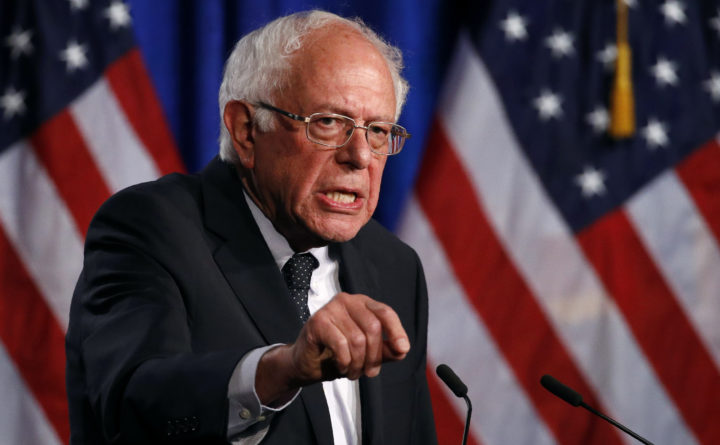By
Bernie Sanders has a 100 percent rating from the American Civil Liberties Union. His support for individual political rights is so unwavering he has called for the enfranchisement of all of America’s incarcerated citizens. His belief in freedom of expression is so unyielding he has scolded progressive college students for shutting down the speeches of far-right speakers. “To me, it’s a sign of intellectual weakness,” the Vermont senator said in 2017. “If you can’t ask Ann Coulter, in a polite way, questions which expose the weakness of her arguments, if all you can do is boo or shut her down or prevent her from coming, what does that tell the world?”
And yet — days after the sitting Republican president asserted an “absolute right” to order criminal investigations into anyone he chooses and began purging the executive branch of civil servants who won’t pledge personal fealty to him — 60 Minutes wants you to know that Sanders may be too authoritarian to be trusted with the presidency.
On last night’s edition of the CBS program, Anderson Cooper made sure to give his viewers “both sides” of the debate over whether Sanders is a crypto-totalitarian. The anchor noted that, while “Sanders says the change he envisions most closely resembles Scandinavian and European countries with democratic governments,” both Donald Trump and Michael Bloomberg have called his proposals communist. Cooper then offered some evidence for the Trump-Bloomberg position and asked Sanders to respond:
Back in the 1980s, Sanders had some positive things to say about the former Soviet Union and the Sandinistas in Nicaragua.Here he is explaining why the Cuban people didn’t rise up and help the U.S. overthrow Cuban leader Fidel Castro: “He educated their kids, gave them health care, totally transformed the society, you know?”Bernie Sanders: We’re very opposed to the authoritarian nature of Cuba, but, you know, it’s unfair to simply say everything is bad, you know? When Fidel Castro came into office, you know what he did? He had a massive literacy program. Is that a bad thing? Even though Fidel Castro did it?Anderson Cooper: A lot of p— dissidents imprisoned in, in Cuba.Bernie Sanders: That’s right. And we condemn that. Unlike Donald Trump. Let’s be clear, you want to — I do not think that Kim Jong-un is a good friend. I don’t trade love letters with a murdering dictator. Vladimir Putin, not a great friend of mine.
One can reasonably critique Sanders’s remarks in political terms. Given the Cuban-American vote in Florida — and/or the devout anti-communist boomer bloc across the nation — the senator might have been wise to put more emphasis on his condemnation of the Cuban government’s authoritarianism and less on the unfairness of how the regime’s legitimate achievements have been elided.
But as a substantive matter, the notion that Sanders’s acknowledgement of the Castro regime’s accomplishments betrays his secret sympathy for authoritarian communism is absurd. It is a fact that Cuba has one of the highest-performing education systems in Latin America, while its medical system has enabled its people to enjoy life expectancy and infant mortality rates similar to those of U.S. residents despite the island’s relative poverty. Meanwhile, with regard to Sanders’s remarks from the 1980s, the claim that Castro’s early social programs mitigated popular opposition to his government is endorsed by many historians of the region.
If offering an (accurately) positive assessment of any aspect of an authoritarian communist regime’s record is tantamount to endorsing its form of rule, then Barack Obama is an authoritarian communist:
As is Michael Bloomberg:
Every modern U.S. president — and a wide array of liberal commentators — has found positive things to say about an absolutist Saudi regime that beheads gays, suppresses all dissent, and had ties to 9/11. Does that mean Obama, Bush, Trump, and Thomas Friedman are all secret totalitarian, anti-American Islamists? Or are those who cite Sanders’s remarks about Cuba as evidence of his closeted authoritarianism judging the senator by a fallacious standard they would never apply universally?
The socialist senator’s critics may counter that his equivocation about Castro must be read in its broader context. After all, Sanders also defended certain discrete policies of other authoritarian regimes. But again, this does not differentiate Sanders from the median major American political figure. Every Cold War–era president championed a wide array of authoritarian rulers for pursuing economic policies the U.S. favored. In the 1980s, Ronald Reagan praised the murderous Guatemalan dictator Efraín Ríos Montt, among other anti-communist despots, far less equivocally than Sanders praised Castro or the Soviet Union.
More important, the proper context for assessing the question “Is Bernie Sanders a Denmark-style, liberal socialist who believes economic justice must not come at the expense of civil liberties and political freedom, or a communist who wants to bury bourgeois democracy beneath the dictatorship of the proletariat?” would be the senator’s actual governing record on civil liberties and political freedom. And that record is more pristine than Trump’s, Bloomberg’s, or most any other 2020 candidate’s.

No comments:
Post a Comment